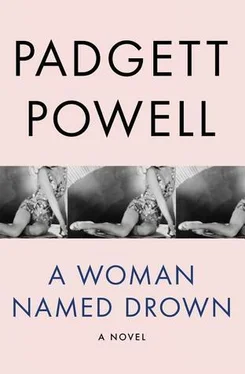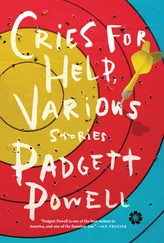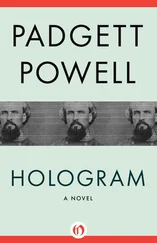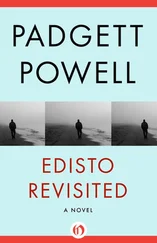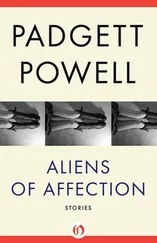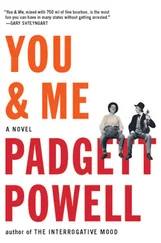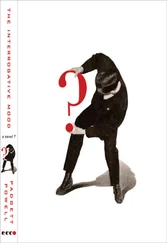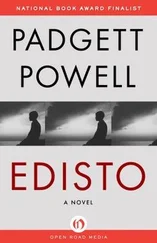"Entropy, Minnie. The wine has a bad case of entropy." She will like new utterance, I thought.
"I love entropy."
Earl was studying his furry car, a worried tune coming from him.
I said to Minnie; "Minnie."
" Yeahyess ," she said.
"Have you always swept floors?"
"No, sir. I have not always swept floors." She said this with a wistful ease that reminded me of Havana Carlisle-as if she were content with a cigar and a sunny street and a secret. "That," she said, "is my prerogative?
"I know it is," I said.
She sat on the parapet, not inelegantly, with her legs crossed. The Carlisle connection was not idle-why did the reaction series put before me these land-mark blacks, and why now what I took to be half-a-black? She was not unlike my mother in the scheme: she was perhaps an isomer, an identical compound in a different structure, to my mother. I thought this quite literally, trusting that it was not strictly a matter of the wine and my purple teeth.
She was isomer to my mother: half black and totally prescient, and my mother, who'd been told she was, in the River Road scheme of things, equivalently only half white, was totally distracted. Earl came over to Minnie and faced her, moving to his own noise in a little rumba motion. I noticed the wine was low, and in the same instant I saw the Pacifist emerge from the shadows on the ground.
"Get one of these," I called to him. He looked up.
"What?"
"With alcohol." I pointed to the bottle, which I held up. He saw Minnie. He turned abruptly back into the shadows. Impressed with the telegraphy of drunks, I turned to discover Minnie and Earl dancing.
Beyond the notion of people with purple teeth dancing a cappella on a roof, the thing to see was Earl. What wasn't coming out of his mouth so clearly was with complete brilliance and precision coming out of his feet. He was leading Minnie very strongly in a fast honky-t0nk kind of swing, Minnie bandying about on the spins like Lucille Ball, Earl like a matador, not disturbing a speck of pea gravel. Minnie's legs flew up for balance, her head back; Earl engineered the next turn, Teflon man. I had never seen a better dancer than Earl.
It was a magical scene. They slowed down a bit. Minnie recovered some form and suggested not so much a slapstick Lucy as a proud, regal Lena Horne. Earl mumbled something very high to her and she said, "You're welcome. Thank you, Earl," and they parted.
The Pacifist was on the roof. "What are y'all doing up here?"
"Hey, sugar," Minnie said, sitting back on the parapet.
"Hello, Minnie," the Pacifist said, rather formally, I thought, perhaps still defending her honor from before.
Minnie extended her glass toward the new bottle, which the Pacifist and I went for.
"Man, all the way down there you can tell you guys are titrating with the purple indicator," the Pacifist said. It was parlance in the department to speak of drinking as titrating, and this Rit-dye wine-the only kind we could get on campus-as "the purple indicator."
"I thought that was tit rate ," Minnie said. "You boys is always tit rating everything." I looked at her; it was hard to tell if she was joking.
The Pacifist didn't care. "We are!" he shouted, as overly loud as he'd been in the bar. "My girlfriends never have any tits."
"That's all right, mine don't, either," Minnie said.
This put the Pacifist into a knee slap. He came out of it teary-eyed. "That's a good one, Minnie."
"I'll tell you a good one," Minnie said. The Pacifist slid down inside the parapet wall next to her in the attitude of a child at storytime. He was a truly unhappy dude.
"Mandy Smith was with the ladies down at the Baptist Ladies' Aid, you know," Minnie said. "And she says, Girls, don't tell Opal Brown about the bazaar because Opal Brown don't have no class. She doesn't know Opal Brown walk up behind her.
"Opal Brown says, Say what? Opal Brown don't have no class? Who bought the genuine simulated crushed-velvet carpet for the pastor to walk on? Opal Brown, that's who. Who bought the dime-store expensive red glasses for the communion? Opal Brown, that's who. No class? Sheeeit. "
The Pacifist started laughing hysterically, sliding over onto the gravel, holding his sides. Before my very eyes I thought I saw the initial reaction in the commencement of his tour that would be identical to mine: when he could, he looked at Minnie with what I took to be sober awe. He was stunned, if I've got the entire thing right, to notice the pleasure afforded him by this most noncustodial of janitors (the second one in these series-James in mine, Minnie in his). She had startled him as I'd been startled by Mary and no-bio gins and flowers and billiards.
Why did these wanderings-they were not Brownian meanders, I was convinced, looking at our purple-mouthed gang-seem to make use of older women early on, and why-I thought of Ebert-James-The Boys-blacks? And why, now, in Minnie, what appeared to be a person of both camps offering a powerful hybrid vigor? Perhaps it was having set up a hundred stiff titrations hours before and drawn a table to accommodate results, but I began to speculate then and there in a fashion altogether too rigorous for the Nose Chemist to approve.
What my reaction series had come to, or brought me to, or made of me, I'm sure is better known at some considerable analytical remove from the way I will have to know my pipette doughboys. I am, perhaps, for example, just some odd precipitate that fell out of a larger event, not the principal product, not practically identifiable, not important. I knew, however, on the roof, that I had had drinks with Minnie before my trip, and the drinks now were entirely another affair. Before, I might have humored her-without condescension and with considerable honest pleasure taken in her company, but it was a humoring all the same. Now I was prepared to have her humor me: I was the one on the roof with the improbably high propensity to dalliance, the incalculable willingness to step sideways and backward before forward.
I decided to call it the anti-actualization quotient. Looking at Earl and Minnie and the Pacifist and a campus full of shadows, the function defined itself as ambition, times self-centered custodial purpose, divided by one's natural opportunities for going up in the world.
People started to key out nicely. The Orphan, I decided, was the Low Quotient Standard and Ebert was the opposite Definitive Standard; his natural opportunities for going up so low that no matter what his ambition, his sense of self-preservation, his anti-actualization value would remain astronomically high. James is a peg lower (lower value equals higher actualization potential), having developed sufficient verbal skills to go up to a secure, ironic position of the deliberately idle, grandly titled factotum. Blacks in general, I thought, despite legislation and whatnot, sense such low values in their denominators, their true opportunities for worldly advance, that they automatically adjust to a reasonably low sense of self-importance to keep things, as it were, in balance (like their blood pressure); and their ambition, which can be high, becomes moot. (Sweeping floors, Minnie says, is her "prerogative.")
An opposite kind of case, with a nearly equal final quotient, is a Bobby Cherry; these good-old-boy gas station dandies have high opportunities, and though their honest ambition is middling, their sense of self-importance is so extremely high that the entire quotient climbs into range with the blacks. It is these identicalanti-actualization quotients that keep the tush-hogs hating the humbler blacks.
And so one can go on. I wanted to rush from the roof and get some graph paper and begin keying people out, but Minnie and the Pacifist, talking as if at the late stages of a loud party, brought me to. The Pacifist was no longer morose. He was en route, in his series. Before Minnie said No class, he was as hooked on the parade of pert tits and young brains as I was-these onward debutantes of science are the arbiters of low anti-actualization. His Shared Devoted and my Dr. Eminence give us headaches and heartaches trying to keep up. High ambitions, bloated importance, normal natural opportunity (higher if you figure afHrmative action)-they balance into an egregious, self-aggrandizing machine that eats people up. These modern whippets are climbing the ladder of success busting the rungs out. They hurl us who would pursue them into courting widows while wearing the deceased's pastels and falling in love with the maid.
Читать дальше
